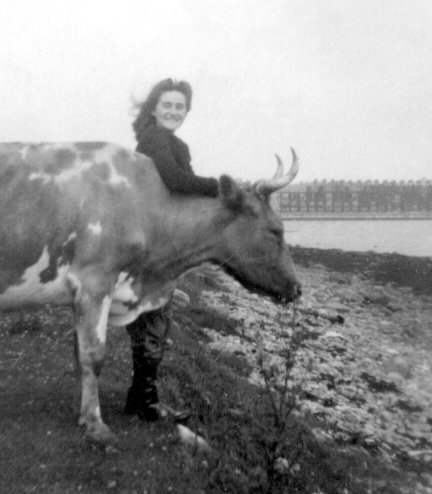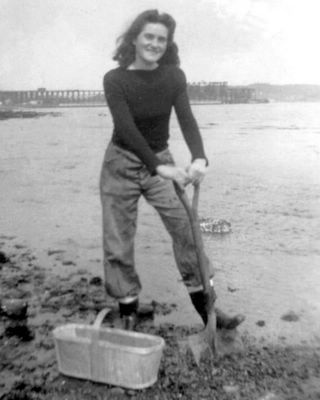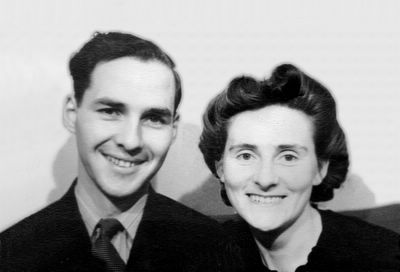By Celia Shaw LeDrew
Deer season in Cape Breton Island during the Depression was one of the big events of the year. Everyone would be talking about it.
Weeks before the season opened I used to beg my father to take me with him as I loved to see the trees, birds, squirrels, partridges, pheasants- I was fascinated by everything that moved in the woods. My father always refused.
When I was 16 my father bought me a single shot, Colt 22 rifle. My father trained me with the gun to shoot the seabirds that came in the harbour quite close to our house and barn which were built on a breakwater. He taught me with old light bulbs we would get from the Marine Repair shop next door. They would bob up and down in the water with the waves, so he felt this was the best way to teach me. He said I should be able to shoot a few ducks when he was at work and our Labrador dog would fetch them in from the sea.
I had to shoot with a direct hit on three out of five bulbs. At first it wasn’t easy but after three or four times I shocked him by getting five out of five.
I loved tramping through the woods that could be so silent, until an animal or a bird would make a move. You must stand very quiet and still to make sure what you were shooting at. Silence is golden when you’re out hunting for food.
It was after the duck episode that I really wanted to go deer hunting but my father insisted it be not for girls. He said, “Never try to shoot a deer with a single shot 22 rifles, and don’t even try! And remember, there’s no such thing as an empty gun, even if it is empty!” We sure had to treat it as loaded.
The day the season opened my father took his 45 Winchester repeater and went off for a deer. He was gone only six or seven hours when he came home with his prize. All us kids could think of was a good hot dinner in the winter and we all seemed to be very happy about my father getting the deer so early in the season.
It didn’t take my father too long to prepare the meat for Mother to put in preserve jars and when the meat was prepared to her specifications out came the Mason jars, the big boiling pot to cook the meat. She would put in one row of meat in the jars and one row of bay leaves until the jars were full and added water. Then the jars were put in the big pot and boiled till the meat was cooked. Usually we had enough meat to do us for the winter but those who never went hunting or never owned a gun came to our back yard where my father was cutting the deer, everyone asking for a piece of the meat. No one was refused, but Mother was giving my father heck because she didn’t have enough preserved for the winter as he gave so much away.
My father told my youngest brother to get a license and asked him if he would try to get another deer to please my Mother. My brother took two days to get a deer and brought it home where every cut had to be perfect.
As he was cutting the meat, there had to be thirty or forty adults with a pot or pan or new paper saying, “I hope you have a piece for me.” I don’t think my brother ever looked up to see who he was giving the meat to. Most of the deer was given to other hungry people. Everybody shared food when plentiful, but he realized that he did not have very much left for my Mother.
There was lots of talk about giving away the most of the deer. Finally, my father said to my brother to take me up to the business office and get me a license (one deer one license.) This was my big chance. My father had taught me and trusted me with the gun and it was O.K. to go look for another deer. They were very plentiful that year, and this was the last day of open season. My father gave me his 45
Winchester repeater.
My brother took me through the swamp. Brush and woods so thick I thought I’d never get out of it. When we came across a small clearing, there were deer everywhere. My brother said, “Aim for the shoulder.” One shot and it dropped right on the ground. My brother said, “Get right over there and put another shot in the head “ (he had to point out where), “and kill it outright. Not a bad shot for a first time.” Then the worst thing happened that could happen.
My brother put his hand in his back pocket and pulled out the hunting knife and said, “Now go slit its throat, and bleed the animal.” I went around the deer in a few circles but fell to the ground. I don’t know how long I was there. My brother kept looking after the deer but stopped once in a while and with his hands scooped up some dirty swamp water and threw it on my face. When I came to my clothes were wet with swamp water, and mud all over me. Everyone in town ribbed me for years about always wanting to go deer hunting.
I never went deer hunting again and never killed a deer since. It was only for food, which meant so much to all of us in the depression in our town.
Many seasons afterwards the people that got some of the meat would always make sure when they saw me to ask if I would be going deer hunting this fall. Never! Never! Never! Once was enough to live down.
When mother prepared the deer meat, every piece of fat or sinew had to be cut off. The meat was soaked in salt water over night, then parboiled in baking soda, to take the game taste off the meat, then into the oven to roast. She always saved bacon fat to baste the meat so it wouldn’t be too dry. The same treatment was given to the sea birds to take away the fishy taste of the fowl. The birds were always roasted with bread dressing. We had much to be thankful for as the Depression was more of a case of survival and we were all made aware of it, and we were all in the same boat.
My parents were always teaching us to make things out of nothing. Mother was an excellent sewer and we wore hand me overs and hand me downs but Mother would make them to fit us kids so that we weren’t too poorly dressed. We never had new clothes for years. Mother would card wool and spin the yarn and we always had sweaters for the winter. She would dye the wool Royal Blue and Cardinal Red and the sweaters would always turn out to be red with blue trim or blue with red trim.
10 Point Buck
My father went deer hunting the next year. He was way back in the bush probably 5 miles from the road when he brought down the biggest deer he had ever shot. It was a ten point buck and he was very pleased.
He no sooner started to clean it when an American hunter came on the scene and offered him a hundred dollars for the deer. Papa said no thanks although it was very tempting. A hundred dollars went a long way in the thirties. But the pride of getting such a big deer won out and he had to cut it up into 3 pieces and make three trips to the road to take it home. All his life he would tell this story and finish it by saying. That deer was so tough you couldn't stick your fork in the gravy.

















